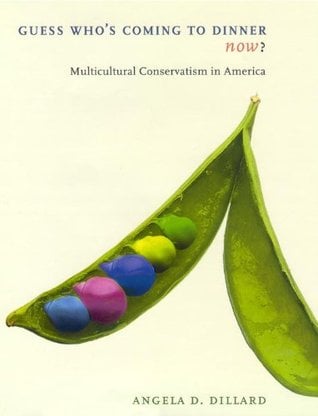According to Angela D. Dillard, “women and minority conservatives have begun to alter irrevocably the tone and complexion of contemporary conservatism.” Despite the leftist affinity of most gays, blacks, Hispanics, and self described feminists, “pariah minorities”—whom Dillard views as belonging to larger “outcast” groups—have come to identify with the American right. Consisting of independent (though misguided) spirits who have braved opposition (as in the case of Clarence Thomas) from both the media and minority organizations, multicultural conservatives are redefining what had been a white. Christian, and predominantly male enclave.
Dillard’s categories are so expansive that, in the end, they explain very little. Even among blacks, it is hard to find much common ground between longtime John Bircher George Schuyler and moderate Republican J.C. Watts. Her methods are no more precise than her categories. Neoconservatives like Bruce Bauer, who became a gay advocate after coming out of the closet, are lumped together with staunch conservatives like Elizabeth Wright, Jay Parker, and Walter Williams—who happen to be black—and the homosexual neoliberal Andrew Sullivan is praised for his “Burkean conservatism” in prescribing homosexual marriage as a stabilizing structure for demoralized gays. Any conservative who might raise his eyebrows at the homosexual lobby is given the usual treatment (accused of “gay-bashing” and religious fanaticism), while Peter Brimelow, despite the measured, courteous language of Alien Nation, expresses “venom” in maliciously reconsidering pro-immigration rhetoric and legislation. (Brimelow, supposedly, is throwing red meat “to segments of the Right that remain inordinately fixated on race.”) Inherent in American conservatism, Dillard explains, is a “desire to silence irreducible collectivities in the name of a constrictive and artificially singular American identity.” Any attempt by blacks and other “pariah” groups to assume this identity renders them inauthentic and turns them into gate-crashing “parvenus.” Dillard shares Toni Morrison’s opinion that the pursuit by American blacks of the American “egalitarian dream” damages the “irreducible collectivity” of black identity. Of course, if that identity were “irreducible,” it would make no difference what American dream blacks pursued for their collective advantage: A consciousness that cannot be taken apart remains always intact. What Dillard and Morrison really want is to create and nurture black solidarity in the face of a declared white majoritarian enemy—an enemy they totally dehumanize, according with a strategy Carl Schmitt associated with modern ideological conflict. It is one thing to view your group as antagonistic toward another; it is something else to dismiss your antagonist as having no valid claim to a group identity and needing, therefore, to form a bogus “collectivity.”
The willingness to accept such a contemptuous definition of white Christian society is what pervades multiculturalism and its multicultural conservative progeny, all of whom expend great effort to find some middle ground between the WASP self-loathing essential to multiculturalism and the conservative duty to perpetuate a cultural and political legacy. No matter how far the conservative movement bends or swerves toward the multicultural left, the accommodation will never be enough. (It is hardly as if that movement has not tried to offer enough, even to the point of expelling its own traditionalist wing.) The problem is, one can never catch up to the demands of those who regard the inherited civilization of the West and the descendants of those who built it with unmixed revulsion. Unlike the meritorious collectivities of designated victim groups, the identity Dillard believes the conservative movement is protecting is “constrictive” and “artificial.” There can be no valid distinction, from her point of view, between sound and unsound conservatives; Good people are determined to cast aside Mosaic morality and open the floodgates to Third World immigration; bad people oppose this progress.
In reality, no such thing as “multicultural conservatism” could exist, but there are genuine black conservatives who defend the same positions white conservatives do. These are not inauthentic multiculturalists but cultural and religious Westerners who happen to be black. Elizabeth Wright, Jay Parker, and other black traditionalists have turned their backs on tribalist myths invented for designated victims. And though there can be conservatives who have not mastered their homosexual inclinations, there can be no conservatism that extols homosexual lifestyles—or treats them as anything but aberrant.
Finally, there is an unbridgeable gulf between Western conservatism and the politics of guilt. Although Western Christian civilization (from which the communists and Nazis fled) has, at its worst, behaved like other civilizations, it has also achieved an incomparable richness of forms. Out of respect for the West’s conception of the spiritual worth of the individual, its invention of constitutional government, and its creation of Sixth Annual almost inexhaustible wonders in philosophy, literature, and the arts and sciences, sane Westerners must feel pride in the civilization now being attacked by its ungrateful beneficiaries, as well as by outsiders. Although Americans are linked culturally and institutionally to their English cousins, it is not just the British part of the Western heritage that commands our admiration. All major European countries contributed remarkably to world civilization and (as Burke perceptively observed) produced overlapping, inventive rearrangements of the Hebrew, Christian, classical, and Germanic components of their identity. Why the heirs to these traditions should think they must don sackcloth and ashes to appease non-Westerners defies rational understanding. Unfortunately, what people like Dillard demand —namely, cultural and moral self-obliteration — Americans and Europeans are all too happy to provide.
[Guess Who’s Coming to Dinner Now? Multicultural Conservatives in America, by Angela D. Dillard (New York: New York University Press) 288 pp., $26.95]

Leave a Reply